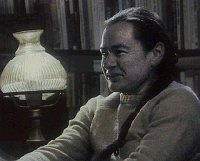
NIIN ETTEI SATTUISI
 "Hän on hieman erikoinen. Ei käy missään tansseissa. Joskus katsomassa näytelmää… Hänellä on varmaan vaikeaa. Ilman miesväkeä ja vanha äiti…"
"Hän on hieman erikoinen. Ei käy missään tansseissa. Joskus katsomassa näytelmää… Hänellä on varmaan vaikeaa. Ilman miesväkeä ja vanha äiti…"
Näin aprikoivat kyläläiset hiljaisesta naapuristaan, Urszula Filsistä, joka jäi nuorena naisena hoitamaan isänsä pientilaa, mikä Puolassakaan ei ole kovinkaan kevyttä työtä.
Ohjaaja Marcel Lozinski teki ohjelman Urzulasta silloin ja palasi nyt 23 vuoden jälkeen katsomaan, oliko Urszula valinnut mielestään oikein. Mikä sai taukoamatta kirjoja lukevan ja espanjalaisista linnoista haaveilevan naisen valitsemaan aamusta yöhön jatkuvan raatamisen? Kuinka lehmät voittivat halun nähdä maailmaa? Eikö elämään kuulu sen jakaminen jonkun läheisen kanssa?
Urszula avautuu toimittajalle enemmän kuin kenellekään muulle koko maailmassa ennen tätä. Urszula sanoo olleensa iloinen, kun ohjaaja löysi hänet näin monen vuoden jälkeen. Mutta hän ei olisi halunnut tämän kaiken satuttavan häntä niin paljon.
- Ohjaaja: Marcel Lozinski
- Tuotanto: Televizio Polski, Poland, 1998
In English In English In English
SO IT DOESN'T HURT
 23 years ago, I made The Visit, a short documentary a young, go-ahead reporter's trip to a village, where she gathered material for her report about Urszula, a young woman who ran a 13 hectare farm all by herself. In those times such ,paragons of virtues" were eagerly sought after by the propaganda, to serve as role models. In the case of Urszula even more so, as she was very keen on literature and teatre. In fact, she could have moved any moment to Warsaw, where her family lived, she could have gone to university, she could have made a professional career like the young reporter.. She decided to stay in the country.
23 years ago, I made The Visit, a short documentary a young, go-ahead reporter's trip to a village, where she gathered material for her report about Urszula, a young woman who ran a 13 hectare farm all by herself. In those times such ,paragons of virtues" were eagerly sought after by the propaganda, to serve as role models. In the case of Urszula even more so, as she was very keen on literature and teatre. In fact, she could have moved any moment to Warsaw, where her family lived, she could have gone to university, she could have made a professional career like the young reporter.. She decided to stay in the country.
The reporter asked her teasingly: Do you consider it sufficient for improving you personality, just reading books and writing to intellectuals, an occasional visit to the theatre?". Urszula answered: "Maybe I need this farm to appreciate the literature, to make a celebration out of it, if it was as an everyday thing, I'd probably treat it differently". That clash of those two completely opposed concepts of life became the basis of my film, a picture on loyalty to oneself and one's ideals.
During the martial law in Poland, the young reporter. moved to Sweden, where she made a career in computer business. Urszula stayed on her farm. All by herself. Today, 1 would like to go back to my protagonist, together with a reporter of the "new generation", who would try to understand that time, Urszula's motivations and the consequences of her choice. We'd see Urszula today, in different Poland. It would be a two-part psychological film about the price paid for being true to oneself. A picture with a somewhat bitter, yet optimistic message: in spite of everything people like Urszula still exist. After 23 years.
MARCEL LOZINSKI
- Director: Marcel Lozinski
- Production: Televizio Polski, Poland, 1998

Päivitys: 26.10.2000 U.E.